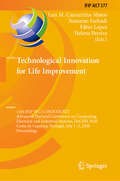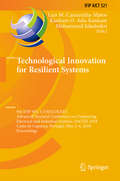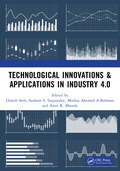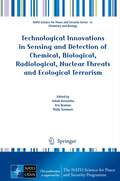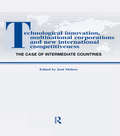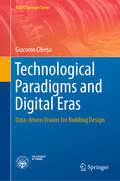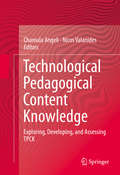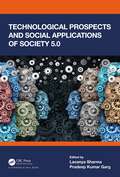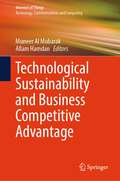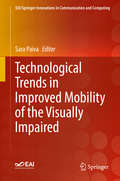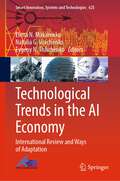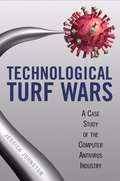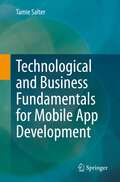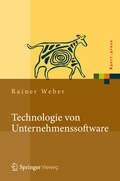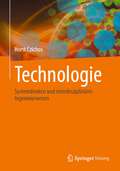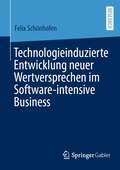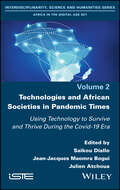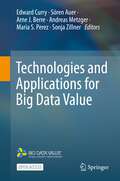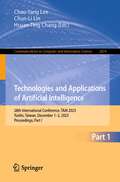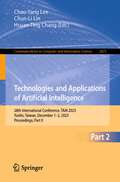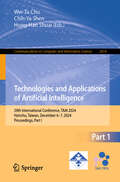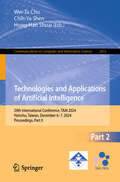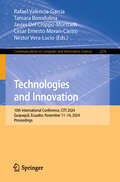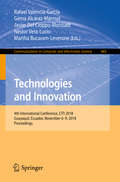- Table View
- List View
Technological Innovation for Life Improvement: 11th IFIP WG 5.5/SOCOLNET Advanced Doctoral Conference on Computing, Electrical and Industrial Systems, DoCEIS 2020, Costa de Caparica, Portugal, July 1–3, 2020, Proceedings (IFIP Advances in Information and Communication Technology #577)
by Luis M. Camarinha-Matos Nastaran Farhadi Fábio Lopes Helena PereiraThis book constitutes the refereed proceedings of the 11th IFIP WG 5.5/SOCOLNET Advanced Doctoral Conference on Computing, Electrical and Industrial Systems, DoCEIS 2020, held in Costa de Caparica, Portugal, in July 2020. The 20 full papers and 24 short papers presented were carefully reviewed and selected from 91 submissions. The papers present selected results produced in engineering doctoral programs and focus on technological innovation for industry and service systems. Research results and ongoing work are presented, illustrated and discussed in the following areas: collaborative networks; decisions systems; analysis and synthesis algorithms; communication systems; optimization systems; digital twins and smart manufacturing; power systems; energy control; power transportation; biomedical analysis and diagnosis; and instrumentation in health.
Technological Innovation for Resilient Systems: 9th Ifip Wg 5. 5/socolnet Advanced Doctoral Conference On Computing, Electrical And Industrial Systems, Doceis 2018, Costa De Caparica, Portugal, May 2-4, 2018, Proceedings (IFIP Advances in Information and Communication Technology #521)
by Luis M. Camarinha-Matos Kankam O. Adu-Kankam Mohammad JulashokriThis book constitutes the refereed proceedings of the 9th IFIP WG 5.5/SOCOLNET Advanced Doctoral Conference on Computing, Electrical and Industrial Systems, DoCEIS 2018, held in Costa de Caparica, Portugal, in May 2018. The 30 revised full papers presented were carefully reviewed and selected from 74 submissions. The papers present selected results produced in engineering doctoral programs and focus on technological innovation for resilient systems. Research results and ongoing work are presented, illustrated and discussed in the following areas: collaborative systems, decision support systems, supervision systems, energy management, smart grids, sensing systems, electrical systems, simulation and analysis, monitoring systems, and energy distribution systems.
Technological Innovations & Applications in Industry 4.0
by Dinesh Seth Sushant S. Satputaley Minhaj Ahemad A. Rehman Amit R. BhendeThe conference offered an international forum for discussion and exchange of knowledge on opportunities and challenges related with all facets and aspects of technological innovations & applications in Industry 4.0, its challenges and way ahead. The objective of this international conference was to provide a platform for policy makers, academicians and researchers to share their experiences and knowledge by presentation of scientific advances made in the field of Industry 4.0.
Technological Innovations in Sensing and Detection of Chemical, Biological, Radiological, Nuclear Threats and Ecological Terrorism
by Ashok Vaseashta Eric Braman Philip SusmannThis book arises from the NATO Advanced Study Institute "Technological Innovations in Detection and Sensing of CBRN Agents and Ecological Terrorism" held in Chisinau, Republic of Moldova in June 2010. It comprises a variety of invited contributions by highly experienced educators, scientists, and industrialists, and is structured to cover important aspects of the field that include developments in chemical-biological, and radiation sensing, synthesis and processing of sensors, and applications of sensors in detecting/monitoring contaminants introduced/dispersed inadvertently or intentionally in air, water, and food supplies. The book emphasizes nanomaterials and nanotechnology based sensing and also includes a section on sensing and detection technologies that can be applied to information security. Finally, it examines regional, national, and international policies and ethics related to nanomaterials and sensing. It will be of considerable interest and value to those already pursuing or considering careers in the field of nanostructured materials and nanotechnology based sensing, In general, it serves as a valuable source of information for those interested in how nanomaterials and nanotechnologies are advancing the field of sensing, detection, and remediation, policy makers, and commanders in the field.
Technological Innovations, Multinational Corporations and the New International Competitiveness: The Case of Intermediate Countries (Routledge Studies in Global Competition)
by JosThe aim of this book is to contribute to a better understanding of those intermediate countries with specific reference to two relevant international areas; those countries of southern Europe whose dynamic is very much influenced by the phases of European construction, and in countries of Latin America where the opening up process has changed the traditional role played by multinational corporations.
Technological Paradigms and Digital Eras: Data-driven Visions for Building Design (PoliTO Springer Series)
by Giacomo ChiesaThe book connects the ICT and the architectural worlds, analyzing modeling, materialization and data-driven visions for design issues at different scales. Furthermore, using sample modeling and materialization tools, it explores the links between performance-driven design approaches and the application of new digital technologies. Intended for architects and urbanists, it provides a theoretical framework to address the implications of the digital revolution in building design and operation. Furthermore, combining insights from IT and ICT with architectural and urban design know-how, it offers engineering professionals a technology-driven interpretation of the building design field.
Technological Pedagogical Content Knowledge
by Charoula Angeli Nicos ValanidesTechnological pedagogical content knowledge (TPCK) reflects a new direction in understanding the complex interactions among content, pedagogy, learners and technology that can result in successful integration of multiple technologies in teaching and learning. The purpose of this edited volume is to introduce TPCK as a conceptual framework for grounding research in the area of teachers' cognitive understanding of the interactions of technology with content, pedagogy and learner conceptions. Accordingly, the contributions will constitute systematic research efforts that use TPCK to develop lines of educational technology research exemplifying current theoretical conceptions of TPCK and methodological and pedagogical approaches of how to develop and assess TPCK.
Technological Prospects and Social Applications of Society 5.0
by Lavanya Sharma P. K. GargThis book provides readers to the vision of Society 5.0, which was originally proposed in the fifth Basic Science and Technology Plan by Japan’s government for a technology-based, human-centered society, emerging from the fourth industrial revolution (Industry 4.0). The implementation of AI and other modern techniques in a smart society requires automated data scheduling and analysis using smart applications, a smart infrastructure, smart systems, and a smart network. Features Provides an overview of basic concepts of Society 5.0 as well as the main pillars that support the implementation of Society 5.0. Contains the most recent research analysis in the domain of computer vision, signal processing, and computing sciences for facilitating smart homes, buildings, transport, facilities, environmental conditions and cities, and the benefits these offer to a nation. Presents the readers with practical approaches of using AI and other algorithms for smart ecosystem to deals with human dynamics, the social objects, and their relations. Deals with the utilization of AI tools and other modern techniques for smart society as well as the current challenging issues and its solutions for transformation to Society 5.0. This book is aimed at graduate and post graduate students, researchers, academicians working in the field of computer science, artificial intelligence, and machine learning.
Technological Sustainability and Business Competitive Advantage (Internet of Things)
by Allam Hamdan Muneer Al MubarakThis book discusses advanced technological solutions in Industry 5.0 that can be used for business competitive advantage and sustainability. The book presents tools that can help reduce time and make use of data in an efficient way while using resources efficiently and sustainably. The book aims to highlight technological sustainability through promoting innovations, improving social development, and providing green products that benefit the society. The authors discuss the recent technological advancements such as Artificial Intelligence (AI), Internet of Things (IoT), Financial Technology (FinTech), Big Data, and Blockchain. They also discuss the benefits of incorporating such technologies in areas such as green supply chain, storage technology, Internet banking, and nanotechnology. The target audience of this book includes all interested individuals and institutions in the fields of engineering, business, technology, and public services. The book provides insights and solutions to many issues and creates opportunities for further sustainability.
Technological Trends in Improved Mobility of the Visually Impaired (EAI/Springer Innovations in Communication and Computing)
by Sara PaivaThis book provides an insight into recent technological trends and innovations in mobility solutions and platforms to improve mobility of visually impaired people. The authors' goal is to help to contribute to the social and societal inclusion of the visually impaired. The book’s topics include, but are not limited to, obstacle detection systems, indoor and outdoor navigation, transportation sustainability systems, and hardware/devices to aid visually impaired people. The book has a strong focus on practical applications, tested in a real environment. Applications include city halls, municipalities, and companies that can keep up to date with recent trends in platforms, methodologies and technologies to promote urban mobility. Also discussed are broader realms including education, health, electronics, tourism, and transportation. Contributors include a variety of researchers and practitioners around the world.Features practical, tested applications of technological mobility solutions for visual impaired people;Presents topics such as obstacle detection systems, urban mobility, smart home services, and ambient assisted living;Includes a number of application examples in education, health, electronics, tourism, and transportation.
Technological Trends in the AI Economy: International Review and Ways of Adaptation (Smart Innovation, Systems and Technologies #625)
by Elena N. Makarenko Natalia G. Vovchenko Evgeny N. TishchenkoThis book is devoted to the study of artificial intelligence from a new perspective – not just a technology but a social institution with complex social connections and relationships. The book systematically highlights technological trends of the artificial intelligence economy and considers all the components of its cascade effect with an overview of international experience and substantiation of promising ways of adapting to the modern stage of technological transit of economic systems. The cascade effect is understood as a chain of interdependent events that are triggered as artificial intelligence takes root in society and the economy. Among the technological trends (current areas of the practical application of artificial intelligence), highlighted in the book, are “smart” homes, digital regions, the use of artificial intelligence to ensure cybersecurity, as well as the optimization of business processes based on artificial intelligence.The book interprets the economics of artificial intelligence as a result of the transition to a digital technological order. A review of modern experience and regulatory perspectives of the institutionalization of the artificial intelligence economy is carried out. The legal framework for combating cyber threats in the artificial intelligence economy has been determined. The promising frameworks for using artificial intelligence in various branches of industry are presented. The book provides practical examples, case studies and proposed frameworks for using AI in various sectors of the economy, which allows using the book as a practical guide to managing the artificial intelligence economy.
Technological Turf Wars: A Case Study of the Computer Antivirus Industry
by Jessica JohnstonInTechnological Turf Wars, Jessica Johnston analyzes the tensions and political dilemmas that coexist in the interrelationship among science, technology and society. Illustrating how computer security is as concerned with social relationships as it is with technology, Johnston provides an illuminating ethnography that considers corporate culture and the workplace environment of the antivirus industry. Using a qualitative, interdisciplinary approach, which combines organizational and security studies with critical and social analysis of science and technology, Johnston questions the motivations, contradictions and negotiations of antivirus professionals. She examines the tensions between the service ethics and profit motives-does the industry release viruses to generate demand for antivirus software?-and considers the dynamics within companies by looking at facets such as gender bias and power politics. Technological Turf Warsis an informed, enlightened and entertaining view of how the production of computer security technology is fraught with social issues.
Technological Turf Wars: A Case Study of the Computer Antivirus Industry
by Jessica R. JohnstonIllustrating how computer security is as concerned with social relationships as it is with technology, Johnston provides an illuminating ethnography that considers corporate culture and the workplace environment of the antivirus industry. Using a qualitative, interdisciplinary approach, which combines organizational and security studies with critical and social analysis of science and technology, Johnston questions the motivations, contradictions and negotiations of antivirus professionals. She examines the tensions between the service ethics and profit motives--does the industry release viruses to generate demand for antivirus software?--and considers the dynamics within companies by looking at facets such as gender bias and power politics. Technological Turf Wars is an informed, enlightened and entertaining view of how the production of computer security technology is fraught with social issues.
Technological and Business Fundamentals for Mobile App Development
by Tamie SalterThis book is an essential introductory guide to the knowledge required to develop apps. Chapter by chapter it provides the core principles any person must understand in order to develop mobile applications. It outlines the fundamental skills and knowledge that business and computer science students need to either oversee the development of a mobile app or themselves undertake to develop a mobile app. This workbook will give a holistic overview of the initial stages that must be considered when endeavoring to develop a mobile app. This workbook breaks topics down into core, technical and non-technical. Looking at each topic from all three angles, the core knowledge required for UI, UI for the technical person and UI for the non-technical person. The workbook guides the student through the key components or core of mobile app development and shows all students both the technical requirements and the non-technical requirements of each topic. It will allow all students to pick and choose how deep they wish to delve into the different topics.
Technologie von Unternehmenssoftware
by Rainer WeberUnternehmenssoftware - das sind operative Anwendungssysteme, analytische Systeme wie Data-Warehouse-Systeme und Planungssysteme, z. B. für das Supply-Chain-Management. In dem Buch werden die zugrunde liegende Technologie und die Modellierungskonzepte beschrieben. Behandelt werden auch Integrationstechniken zur Verbindung mehrerer Systeme, Methoden im Lebenszyklus von Unternehmenssoftware sowie Client-Server-Technologie und Geschäftsobjekte, aber auch neue Entwicklungen wie Cloud-Computing. Mit vielen Beispielen und Übungen mit Lösungsvorschlägen.
Technologie: Systemdenken und interdisziplinäres Ingenieurwesen
by Horst CzichosDieses prägnante Lehrbuch führt einen Systemansatz in die Technik ein und beschreibt tribologische, mechatronische und cyber-physikalische Systeme sowie das technologische Konzept der Industrie 4.0 für Studierende verschiedener technischer Fachrichtungen. "Technologie" bezieht sich in diesem Buch auf die Gesamtheit der vom Menschen geschaffenen, nutzenorientierten Produkte, die auf technischen Kombinationen von Material, Energie und Information basieren. Dr. Czichos untersucht Technologie in diesem Band im Kontext des Systemdenkens im Hinblick auf die folgenden Haupttechnologiebereiche:Technische Systeme mit "interagierenden Oberflächen in Relativbewegung", insbesondere im Maschinenbau, in der Produktion und im Transportwesen; einschließlich der Analyse von reibungsbedingten Energieverlusten und verschleißbedingter Materialdissipation. Technische Systeme, die eine Kombination aus Mechanik, Elektronik, Steuerung und Computertechnik für die Bedürfnisse von Industrie und Gesellschaft erfordern. Technische Systeme mit einer Kombination aus Mechatronik und Internetkommunikation. Cyber-physikalische Systeme für die Digitalisierung der Industrie im Entwicklungsprojekt Industrie 4.0.Betrachtet Technik als Kombination aus der physischen Welt und der digitalen virtuellen Welt der Information und Kommunikation.Beschreibt den Produktzyklus von technischen Systemen und die Eckpfeiler der Technik: Material, Energie und Information.Stellt eine ganzheitliche Betrachtung von Technik und Engineering dar.
Technologieinduzierte Entwicklung neuer Wertversprechen im Software-intensive Business
by Felix SchönhofenDie Digitalisierung der meisten Branchen spiegelt sich in einem wachsenden Anteil der Software an der Gesamtwertschöpfung wider. Unternehmen eröffnen sich dadurch neue Möglichkeiten für technologische Innovationen. Gleichzeitig stehen sie aber vor der ständigen Herausforderung, diese Innovationen in Produkte zu überführen, die für den Kunden wertstiftend sind. Dieser Problemstellung widmeten sich bereits eine Reihe an Methoden zur Produkt- und Geschäftsmodellinnovation, die Überführung der hier gewonnenen Erkenntnisse in die konkrete Produktgestaltung bleibt jedoch eine Herausforderung.Genau hier setzt diese Arbeit an, indem sie die methodische Vorgehensweise „Value Proposition Deployment“ vorschlägt, mit der Unternehmen auf Basis technologischer Innovationen neue Wertversprechen entwickeln können. Hierzu verbindet das Value Proposition Deployment Erkenntnisse des Innovationsmanagements mit Methoden der konstruktiven Qualitätssicherung und stellt somit eine Brücke zwischen Innovations- und Qualitätsmanagement dar. Die auf Basis von 15 praxisrelevanten Gestaltungsanforderungen entwickelte Methode wird detailliert erläutert und anhand praxisnaher Fallbeispiele beschrieben.
Technologies and African Societies in Pandemic Times: Using Technology to Survive and Thrive During the Covid-19 Era
by Saikou Diallo Julien Atchoua Jean-Jacques Maomra BoguiIn February 2020, the Coronavirus pandemic became a worldwide health emergency, and in April of that year, the ITU and the WHO created a joint declaration to show their commitment to using ICTs to overcome the pandemic. Technologies and African Societies in Pandemic Times explores the impact of Covid-19 on African societies in North and West Africa through the lens of technology and social media. The authors of this book highlight how everyday people dealt with the pandemic from its onset, through the process of the development of the vaccine and to its eventual dissemination. This book tells stories of survival, of coping and, eventually, of economically thriving. The authors also describe how, in this extremely challenging moment for humanity, people used music, art and social media to reinvent the community, to share joy and pain and to try to remain connected.
Technologies and Applications for Big Data Value
by Edward Curry Sören Auer Andreas Metzger Sonja Zillner Arne J. Berre Maria S. PerezThis open access book explores cutting-edge solutions and best practices for big data and data-driven AI applications for the data-driven economy. It provides the reader with a basis for understanding how technical issues can be overcome to offer real-world solutions to major industrial areas.The book starts with an introductory chapter that provides an overview of the book by positioning the following chapters in terms of their contributions to technology frameworks which are key elements of the Big Data Value Public-Private Partnership and the upcoming Partnership on AI, Data and Robotics. The remainder of the book is then arranged in two parts. The first part “Technologies and Methods” contains horizontal contributions of technologies and methods that enable data value chains to be applied in any sector. The second part “Processes and Applications” details experience reports and lessons from using big data and data-driven approaches in processes and applications. Its chapters are co-authored with industry experts and cover domains including health, law, finance, retail, manufacturing, mobility, and smart cities. Contributions emanate from the Big Data Value Public-Private Partnership and the Big Data Value Association, which have acted as the European data community's nucleus to bring together businesses with leading researchers to harness the value of data to benefit society, business, science, and industry.The book is of interest to two primary audiences, first, undergraduate and postgraduate students and researchers in various fields, including big data, data science, data engineering, and machine learning and AI. Second, practitioners and industry experts engaged in data-driven systems, software design and deployment projects who are interested in employing these advanced methods to address real-world problems.
Technologies and Applications of Artificial Intelligence: 28th International Conference, TAAI 2023, Yunlin, Taiwan, December 1–2, 2023, Proceedings, Part I (Communications in Computer and Information Science #2074)
by Chao-Yang Lee Chun-Li Lin Hsuan-Ting ChangThis book constitutes the proceedings of the 28th International Conference on Technologies and Applications of Artificial Intelligence, TAAI 2023, which was held in Yunlin, Taiwan, during December 1–2, 2023. `The 35 full papers and 12 short papers included in this book were carefully reviewed and selected from 193 submissions. The TAAI 2023 provides a platform for experts and scholars from domestic and international universities, research units, and industries to exchange AI technologies and application results.
Technologies and Applications of Artificial Intelligence: 28th International Conference, TAAI 2023, Yunlin, Taiwan, December 1–2, 2023, Proceedings, Part II (Communications in Computer and Information Science #2075)
by Chao-Yang Lee Chun-Li Lin Hsuan-Ting ChangThis book constitutes the proceedings of the 28th International Conference on Technologies and Applications of Artificial Intelligence, TAAI 2023, which was held in Yunlin, Taiwan, during December 1–2, 2023.The 35 full papers and 12 short papers included in this book were carefully reviewed and selected from 193 submissions. The TAAI 2023 provides a platform for experts and scholars from domestic and international universities, research units, and industries to exchange AI technologies and application results.
Technologies and Applications of Artificial Intelligence: 29th International Conference, TAAI 2024, Hsinchu, Taiwan, December 6–7, 2024, Proceedings, Part I (Communications in Computer and Information Science #2414)
by Wei-Ta Chu Chih-Ya Shen Hong-Han ShuaiThis two-volume set CCIS 2414 and CCIS 2415 constitutes the refereed proceedings of the 29th International Conference on Technologies and Applications of Artificial Intelligence, TAAI 2024 held in Hsinchu, Taiwan, during December 6–7, 2024. The 49 full papers presented in these two volumes were carefully reviewed and selected from 147 submissions. The papers are organized in the following topical sections: Part I: Data Robustness; Image Analysis; Knowledge Representation and Management; Games; Machine Learning and Applications; AI Studies; JSAI Special Session 1. Part II: JSAI Special Session 2; Japan Special Session 3; International Track Special Session.
Technologies and Applications of Artificial Intelligence: 29th International Conference, TAAI 2024, Hsinchu, Taiwan, December 6–7, 2024, Proceedings, Part II (Communications in Computer and Information Science #2415)
by Wei-Ta Chu Chih-Ya Shen Hong-Han ShuaiThis two-volume set CCIS 2414 and CCIS 2415 constitutes the refereed proceedings of the 29th International Conference on Technologies and Applications of Artificial Intelligence, TAAI 2024 held in Hsinchu, Taiwan, during December 6–7, 2024. The 49 full papers presented in these two volumes were carefully reviewed and selected from 147 submissions. The papers are organized in the following topical sections: Part I: Data Robustness; Image Analysis; Knowledge Representation and Management; Games; Machine Learning and Applications; AI Studies; JSAI Special Session 1. Part II: JSAI Special Session 2; Japan Special Session 3; International Track Special Session.
Technologies and Innovation: 10th International Conference, CITI 2024, Guayaquil, Ecuador, November 11–14, 2024, Proceedings (Communications in Computer and Information Science #2276)
by Rafael Valencia-García Néstor Vera-Lucio Javier Del Cioppo-Morstadt Tamara Borodulina Cesar Ernesto Moran-CastroThis book constitutes the refereed proceedings of the 10th International Conference on Technologies and Innovation, CITI 2024, held in Guayaquil, Ecuador, during November 2024. The 15 full papers presented in this volume were carefully reviewed and selected from 38 submissions. These papers have been organized under the following topical sections: Artificial intelligence in Agriculture; Natural language processing and semantic web; Machine learning; Software tools.
Technologies and Innovation: 4th International Conference, CITI 2018, Guayaquil, Ecuador, November 6-9, 2018, Proceedings (Communications in Computer and Information Science #883)
by Rafael Valencia-García Gema Alcaraz-Mármol Néstor Vera-Lucio Martha Bucaram-Leverone Javier Del Cioppo-MorstadtThis book constitutes the proceedings of the 4th International Conference on Technologies and Innovation, CITI 2018, held in Guayaquil, Ecuador, in November 2018. The 21 full papers presented in this volume were carefully reviewed and selected from 64 submissions. They are organized in topical sections named: ICT in agronomy; software engineering; intelligent and knowledge-based systems; e-learning.
